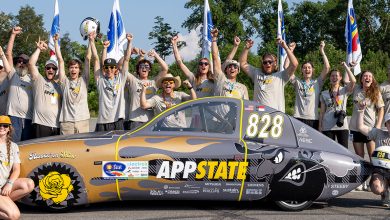Last Updated on April 8, 2017 8:23 pm
Appalachian State is confirming a case of mumps on campus. In an email, and website post, to students, faculty and staff on Saturday evening the university says that they are, “providing this information in the interest of maintaining open communication about the potential of exposure.”
The email/posting goes on to say, “It is important to note that the individual diagnosed with the virus is being treated, and that actions are in effect to minimize contact with this person.”
The dates when this student could have passed infection to others are in the days ranging from April 4-April 11, 2017, according to the email/posting. Appalachian State University, AppHealthCare (Appalachian District Health Department) and the North Carolina Division of Public Health are working together to investigate this case and prevent the spread of mumps.
The rest of the email and posting is below:
Below we have summarized important information regarding mumps exposure and symptoms to encourage community members to promptly report suspected mumps cases.
- What causes mumps?
- Mumps is caused by a virus.
- How does mumps spread?
- The mumps virus is spread through direct contact with respiratory secretions or saliva or through sharing items like cups or utensils with an infected person. The risk of spreading the virus increases the longer and closer the contact a person has with someone who has mumps. The average incubation period (from exposure to onset of illness) for mumps is 16-18 days, with a range of 12-25 days. People with mumps are considered most infectious from two days before through five days after the onset of symptoms.
- What are the symptoms of mumps?
- Individuals with mumps usually first feel sick with nonspecific symptoms like headache, loss of appetite and low-grade fever. The most well-known sign of mumps is parotitis, the swelling of the parotid salivary glands, below the ear. Some people who get mumps have very mild or no symptoms, and often they do not know they have the disease. There are no medicines to treat mumps, but most people recover completely in a few weeks.
Prevention
Vaccination is the best way to prevent mumps. Two doses of MMR vaccine are approximately 88% effective at preventing the disease; one dose is approximately 78% effective.
MMR vaccine should be administered to persons without evidence of immunity and everyone should be brought up to date with age appropriate vaccination (one or two doses). Although MMR vaccination has not been shown to be effective in preventing mumps in persons already infected, it will prevent infection in those persons who are not yet exposed or infected. Those born before or during 1957 are considered immune based on likely exposure during childhood.
It is important to recognize that mumps can occur in vaccinated people. During mumps outbreaks in highly vaccinated communities, the proportion of cases that occur among people who have been vaccinated may be high. This should not be interpreted as meaning that the vaccine is not effective; people who have not been vaccinated against mumps are much more likely to get mumps than those who have been fully vaccinated.
Again, Appalachian State University, AppHealthCare (Appalachian District Health Department) and the North Carolina Division of Public Health are working together to share information and take action as appropriate.
Additional information is available at:
A questions and answers sheet can be found here for more information: http://www.immunize.org/catg.d/p4211.pdf (PDF)
If you are not feeling well, or if you are exhibiting any of the symptoms listed above, please take steps to limit your contact with others.
Students who are concerned about symptoms they might be experiencing can contact Student Health Services at 828-262-3100. Calls to this number are answered 24/7. Additionally, Appalachian’s Student Health Services will be open extended hours tomorrow from 1-6pm.
Faculty or staff who are concerned about symptoms are encouraged to contact their primary health care providers, urgent care or Watauga Medical Center.
We will communicate with you as needed if we learn of any additional measures we should take to prevent additional cases of mumps in our community.
Thank you.
Beth Lovette
Health Director
AppHealthCare (Appalachian District Health Department)
Dr. Robert Ellison
Director of Student Health Services
Appalachian State University
















